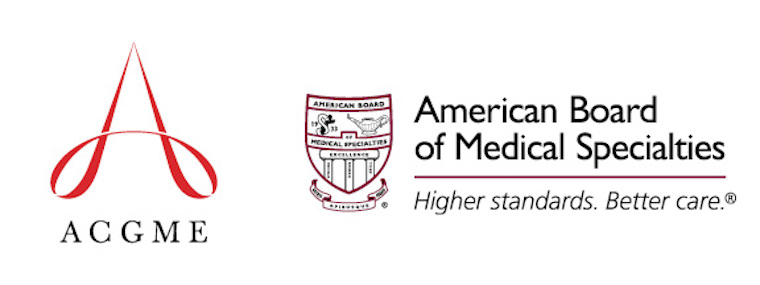The American Board of Medical Specialties and Accreditation Council for Graduate Medical Education Joint Principles: Physician Training During the Coronavirus Disease 2019 Pandemic
PREAMBLE
The American Board of Medical Specialties (ABMS) and the Accreditation Council for Graduate Medical Education (ACGME) appreciate the extraordinary efforts of physicians and trainees who are working tirelessly to treat patients affected by Coronavirus Disease 2019 (COVID-19), and we recognize the associated increased health risks and the potential for training disruptions. Our shared concern is for the health and wellbeing of these individuals and the patients they treat and the desire to maintain a strong and effective healthcare workforce. To provide clarity for trainees and programs during this extraordinary time, the ABMS and ACGME offer the following statement of joint principles and will continue to address ongoing developments.
ABMS AND ACGME JOINT PRINCIPLES: PHYSICIAN TRAINING DURING THE COVID-19 PANDEMIC
- The American Board of Medical Specialties (ABMS) and the Accreditation Council for Graduate Medical Education (ACGME) are deeply committed to creating and supporting a strong national physician workforce.
- The ABMS and the ACGME, which set professional standards for physician certification and accredit residency and fellowship training programs respectively, understand that the unique situation brought on by the COVID-19 pandemic requires flexibility and creativity to maintain both organizations’ shared commitment to the public to ensure that physicians practice medicine safely and efficaciously.
- The ABMS and the ACGME endorse and rely upon the authority and judgment of Clinical Competency Committees (CCCs) and training program directors (PDs) to determine readiness for unsupervised practice and to inform specialty board decisions regarding eligibility for initial board certification. This authority and judgement are especially important during times of crises when traditional time- and volume-based educational standards may be challenged.
- PDs and CCCs have the ability to assess trainee readiness for unsupervised practice in a variety of different ways, including utilization of Milestone data, Entrustable Professional Activities (EPAs), and review of data from a variety of assessment methods (in-training examinations, clinical evaluations, case/procedural logs, multi-source feedback, direct observation in real or simulated situations, etc.). While the types of competency assessments may vary across specialty, program, and institution, the ABMS and ACGME do expect programs to use rigorous, valid, and reliable combinations of assessments that are appropriate within each specialty.
- ABMS and ACGME understand and affirm that the judgment made by PDs and CCCs to assess trainees constitutes a vital responsibility that affects residents, fellows, and most importantly, the care of the public.


